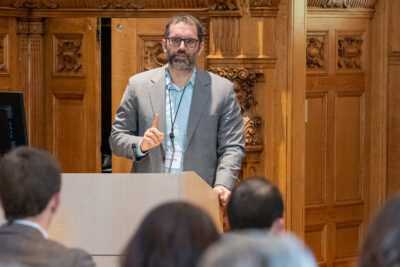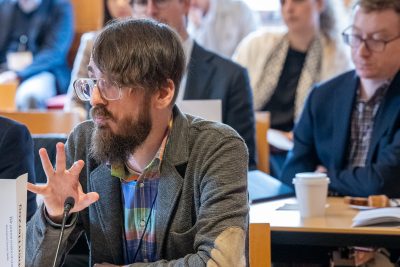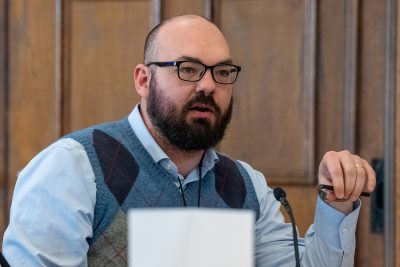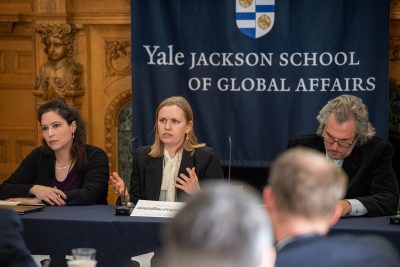Nuclear weapons are once again at the top of the scholarly and policy agenda after being on the sidelines of discourse for decades. Russia’s 2022 invasion of Ukraine and Putin’s brinkmanship have reignited concerns over nuclear war. Prospects for arms control agreements between the United States, Russia, and China appear dim, with the termination of the Intermediate-Range Nuclear Forces (INF) Treaty and China’s nuclear buildup. Efforts to curb Iran’s nuclear program face important challenges, and North Korea continues to develop its nuclear arsenal.
To better understand and address these increasingly complex and challenging realities, ISS launched the Nuclear Security Program (NSP), led by Associate Professor of Political Science Alexandre Debs. Housed within ISS, it builds on ISS’ s success in producing innovative research and teaching initiatives. Importantly, it also aims to diversify voices and perspectives on nuclear security.
Yale University has long been a pioneer in crafting debates around nuclear security. As the world was still reeling from the attacks on Hiroshima and Nagasaki, Bernard Brodie at Yale’s Institute of International Studies conceptualized how we should contend with “the absolute weapon” and avoid nuclear war (Brodie 1946). Since then, Yale has trained a large group of academics to better understand our nuclear world, in its graduate programs and the ISS community. Yale students have also gone on to make key contributions to U.S. nuclear security and foreign policy more generally, including Dean Acheson (YC 1915), Roswell Gilpatric (YC 1928, Law 1931), Cyrus R. Vance (YC 1939, Law 1942), Paul Warnke (YC 1941), Gerald R. Ford, Jr. (Law 1941), George H. W. Bush (YC 1948), John F. Kerry (YC 1966), George W. Bush (YC 1968), William J. Clinton (Law 1973), Hillary R. Clinton (Law 1973), and Jake Sullivan (YC 1998, Law 2003).
Nuclear Security Faculty
Faculty affiliated with the Nuclear Security Program teach a range of classes to both undergraduate and graduate students, on nuclear politics, international security, and game theory. They also participate in the activities of the program throughout the year, including the research and policy workshop.
Nuclear Security Fellows
The Nuclear Security Program brings together Yale undergraduate and graduate students and early-career scholars with a demonstrated interest in nuclear security to be fellows. These fellows participate in the activities of the program throughout the year, including the research and policy workshop.
Candidates for the fellowship apply for summer research and travel awards via the Yale Student Grants Database (keyword: Nuclear Security Program). Applications typically open in January and close in March. The summer research and travel awards may support undergraduate students in pursuing a senior essay project or an internship, and graduate students in pursuing a project for their dissertation or master’s thesis as well as any internship related to nuclear security.
Awards range from $500 to $5000 and are to be used in the following summer. Recipients of an award become fellows of the program.
Research and Policy Workshop
The Nuclear Security Program invites speakers to campus and hosts a series of discussions each semester on topics related to nuclear security. Events are often held jointly with the IR Workshop and the ISS Colloquium.
Nuclear Security Symposium
The Nuclear Security Program’s first symposium in May 2023 brought together scholars from political science, history, and the policy world. The event focused on three themes:
- Nuclear Proliferation: What explains a state’s acquisition of nuclear weapons? How have concerns for nuclear proliferation affected relations between enemies and allies?
- Arms Control: What determines the outbreak of arms races between nuclear enemies? What explains the rise and demise of arms control agreements?
- Nuclear Posture and Crisis Dynamics: What explains a state’s nuclear posture? What has been the effect of nuclear possession—and superiority—on the likelihood of war, the uses of conventional military power, and crisis dynamics?




